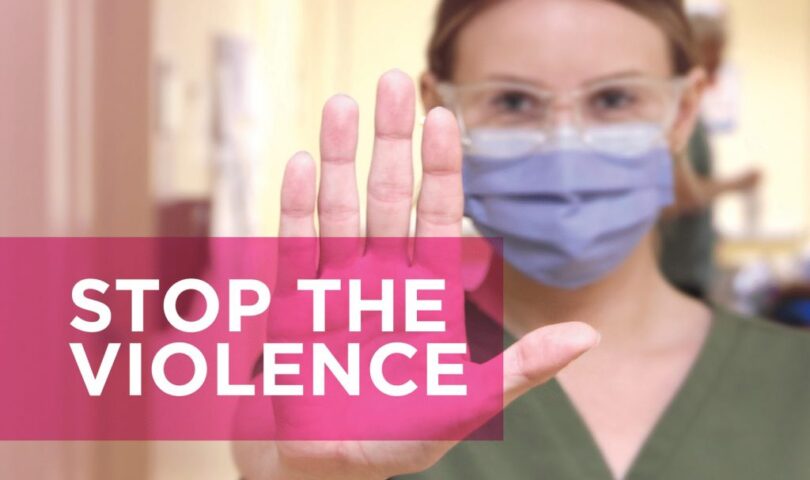Penalties for assaulting a health care worker or volunteer would double in Michigan under legislation moving through the state Legislature.
The two-bill package aims to address the rise in violence directed at hospital staff during the pandemic that backers say has contributed to burnout and an acute worker shortage in the health care industry.
“Violence against health care workers is contributing to the unprecedented workforce challenges we are experiencing across our health system. Health care staffing is at a breaking point with violence against colleagues as a contributing factor,” Michelle Pena, chief nursing officer at Trinity Health Grand Rapids, told state lawmakers during recent committee testimony on House Bills 4520 and 4521.
“Consistent with research in this area and what other health systems are facing, both physical and verbal aggression are impacting the well-being of our colleagues as evidenced by an all-time high rate of burnout,” Pena said. “We are obligated to take care of patients. There is no ability to turn them away because they are violent, and most patients are not violent, but the ones who are risk quality and safety for all other patients and our colleagues.”
Pena cited U.S. Bureau of Labor Statistics data that show health care and social service workers are five times more likely to experience an injury from workplace violence than workers overall.
Incidents have increased in “both the frequency and severity of violent incidences during the COVID pandemic and this continues today,” said Pena, citing examples where co-workers have had to take time off after suffering concussions and a pregnant woman suffered internal bleeding, as well as injuries such including a fractured jaw, dislocated shoulders, and “severe anxiety from an assault.”
Just this month, a colleague at Trinity Health sustained three fractured facial bones from an assault, she said.
H.B. 4520 would double the fine from $500 to $1,000 for a person who’s convicted or pleads guilty to assaulting or battering a heath care worker, a misdemeanor that is also punishable by up to 93 days in jail.
Under H.B. 4521, the penalty would increase to one year in jail and a $2,000 fine if the incident occurred when a worker or a volunteer was performing their duties. If a weapon was involved, the penalty would go to up to four years in prison and a $2,000 fine.
The bills would require operators of health facilities to post a sign “in a prominent and visible location” that details the higher fine, which would not apply to patients receiving treatment, although a person “could still be subject to prosecution” under state law, according to an analysis by the House Fiscal Agency.
In her testimony this month, Pena urged legislators to adjust language in the bills to apply higher penalties “to those patients who have adequate cognitive function with decision-making capacity and commit acts of violence against our health care workers and medical volunteers.”
“While no act of violence against our staff is acceptable, we recognize that many of our patients involved in these incidents don’t have the cognitive capacity to understand their actions,” she said.
The House Criminal Justice Committee this week voted unanimously to back both bills and send them to the full House for consideration.
Health care executives and associations have been speaking out publicly for two years on the increases in verbal abuse and physical violence directed toward workers during the pandemic.
The Michigan Health & Hospital Association cited information from a study by the Emergency Nurses Association that reported more than half of ER nurses have experienced verbal or physical abuse.
Dr. Denny Martin, chief medical officer at Sparrow Hospital in Lansing, told the state House panel that heightened violence toward health care workers pre-dates the pandemic and has continued to worsen. Except for a period when access by visitors was restricted in the pandemic, incidents at Sparrow Hospital increased 200% over five years and are happening at a rate approaching two a day, Martin said.
“Our hospitals are regularly challenged by short staffing, and we need to do everything we can to make sure our caregivers have the protection they need,” said Martin, calling the bills a “step in the right direction.”
Incidents have caused health care workers to leave the profession or graduates entering the workforce to look for positions in a safer environment than a hospital, such as a medical office, outpatient setting or virtual care position, Martin said.
“This is really impacting our ability to care for patients in our hospital,” he said.
Adam Carlson, the Michigan Health & Hospital Association’s vice president of advocacy, told lawmakers that many hospitals have attempted to address the higher incidence rates with increased security and training, including on how to de-escalate a situation.
Trinity Health Grand Rapids has worked with the Grand Rapids Police Department to have an office in the ER during the night shift and created a special response team that includes a security officer, a social worker and a psychiatric nurse, Pena said. The team responds to “high-risk and escalated situations” and provides “further expertise in de-escalation,” she said.
The hospital also added a K-9 unit to its security team and committed to supporting staff who take legal action against anybody who assaults them.
“Despite these efforts, violent incidents continue to increase,” Pena said.
- NBA legend Chauncey Billups, Heat’s Terry Rozier arrested as part of FBI gambling probe - October 23, 2025
- MSP Troopers Respond to Rollover Crash on I-75 in Soo Township - October 21, 2025
- Gov. Whitmer Lowers Flags to Honor Former Congresswoman Carolyn Cheeks Kilpatrick - October 21, 2025




